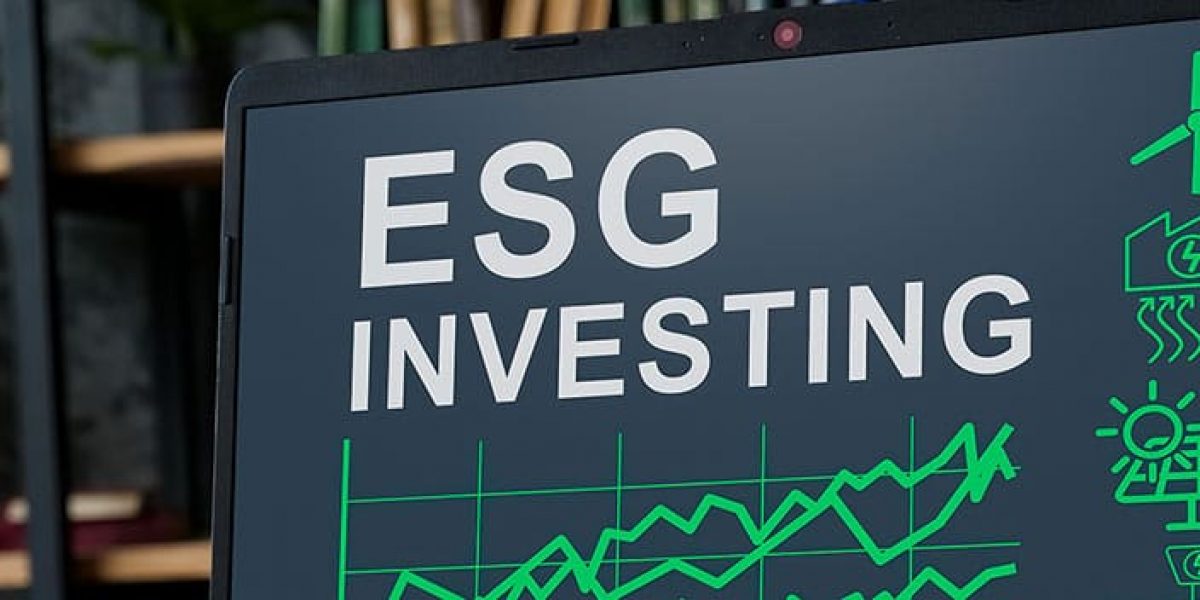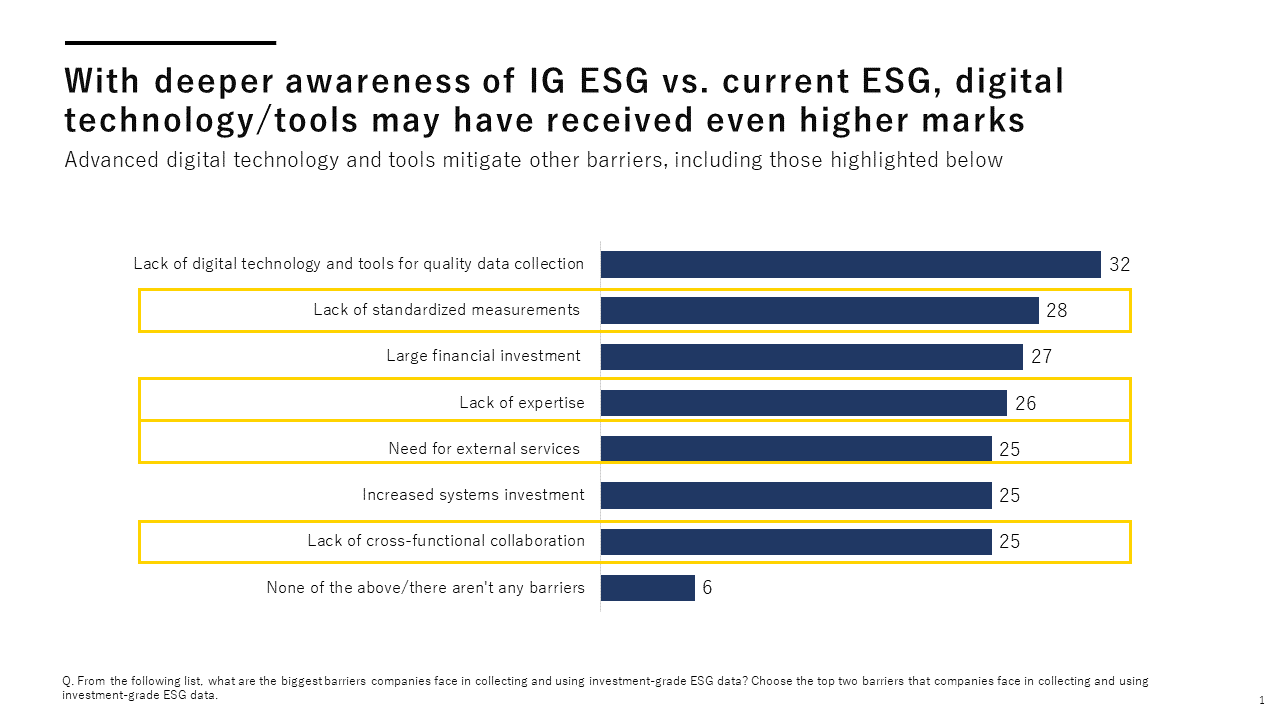Inaugural Benchmark Gensuite Survey: Investor Attitudes on Company ESG Data Confirms Investors’ Dissatisfaction with Companies’ ESG Data, Underscoring Need for Companies to Adopt Better Enterprise ESG Program Measurement, Management and Reporting Solutions
The Environmental, Social and Governance (ESG) phenomenon in global capital markets has accelerated over the last couple of years, and it shows no signs of slowing any time soon.
If companies want a piece of the estimated $50 trillion in ESG funds available by 2025, then, they will need to incorporate financially relevant ESG factors into corporate governance, capital allocation and capital raise decision-making as part of their risk management and investor relations programs. And they’re going to need to back up their ESG impact with hard data.
That is no longer just an assertion or an educated guess. The 2021 Benchmark Gensuite Survey: Investor Attitudes on Company ESG Data from Benchmark Gensuite® and ClearPath Strategies proves as much. Investors believe companies lack “investment-grade” (IG) ESG data. Across the sample of 770 investment decision-makers, 32% of respondents say a “lack of digital technology and tools for quality data collection” is the primary barrier companies face in collecting and using IG ESG data. The study identified a host of other barriers, including:
- The persistent lack of standardized metrics and methods for measuring and reporting IG ESG data (28%)
- A lack of relevant in-house expertise in measuring and reporting ESG company performance (26%)
- The need for external services (25%)
- A lack of cross-functional collaboration and appropriate ESG performance measurement and reporting workflows (25%)
These and other findings reflect three fundamental conclusions that my Benchmark colleagues and I have reached through our decades of combined experience in helping corporations and other organizations navigate their ESG journeys.
1. The first is that, while “sustainability” and “ESG” are oftentimes thought to mean the same thing among CxOs, this is not the case. Corporate ESG programs, practices and initiatives are decidedly more complex than those that fall under the umbrella of corporate sustainability efforts. ESG is about identifying sustainability issues with measurable financial implications for an organization, as opposed to the sustainability issues that will presumably have positive ESG outcomes. By the same token, ESG is about translating the company’s management of those financially-relevant sustainability issues into actionable financial information. Finally, ESG is about packaging that sustainability performance data in a manner that enables investors to confidently track and compare it against various benchmarks.
In short, ESG is about undergirding corporate sustainability efforts with rigorous measurement and reporting practices. And business leaders who do not take this into account can expect that their sustainability efforts will fail to attract the financial, reputational and other returns they’re intended to.
2. The second of these conclusions is the importance investors put on IG ESG data from companies. Our survey finds that 85% of investors, including 91% of Institutional Investors, consider IG ESG data more important than other company data when informing their investment decisions. Accordingly, business leaders who succeed in collecting, using and disclosing IG ESG data can expect to be rewarded. 94% of respondents to our survey say that they are more likely to invest in companies that produce, use and report IG ESG performance data than they are in those that don’t. And 91% of respondents say they would have greater confidence in the senior leadership team of companies that successfully collect, use and disclose IG ESG data.
3. The third conclusion–and the one that requires the most immediate action from companies and organizations– is the degree to which investors say companies are failing to produce the IG ESG data they expect and, importantly, the reasons investors say these shortcomings persist—despite the clear financial incentive for companies to redress them. Only 64% of respondents say the ESG data that Fortune 500 companies produce meets their definition of “investment grade.” And despite the plurality of respondents (39%) who say companies’ Environmental data are the most important for their investment decisions, 80% say the quality of these data needs improvement.
Investment decision makers give a lot of reasons for why the data is insufficient. Chief among them is the perceived lack of digital technology and tools for quality data collection (32%). Perhaps unsurprisingly, the survey suggests there is agreement among investors regarding the ways in which companies can improve the quality of their ESG performance data. A plurality of respondents say the biggest driver of improvement of company ESG data would be to provide digital technology and tools that help collect accurate and reliable data (37%).
This final conclusion affirms Benchmark’s founding mission. We are a company whose primary purpose is to help organizations quantify and report the financial impacts of sustainability issues on their bottom lines and, in turn, help those same organizations measure the outcomes of their ESG issues management. These are the insights companies need in order to apply rigor to their sustainability efforts and ensure that their efforts help maximize their financial performance and minimize their exposures to regulatory, reputational and other risks.
Further, there is a misperception in the market about the availability of cloud-based ESG program management solutions for companies. It is not as limited as our respondents suggest. These solutions are both commercially available and beneficial for their users. Today’s cloud-based ESG program management solutions possess the features and offer the functionality that enterprise end-users need to overcome many of the other barriers that our survey respondents say impede companies’ collection, usage and disclosure of IG ESG data.
Business leaders who want to continuously improve their organizations’ ESG performance need not be discouraged from doing so by the mix of conflicting disclosure standards, divergent stakeholder expectations, and evident lack of relevant in-house expertise. They must know that they often already have the ESG data that investors are looking for. It’s just a matter of extracting it, analyzing it, leveraging it to inform business decisions and, critically, packaging it in a manner that investors and other stakeholders can understand, trust and act upon themselves. And equipped with the right enterprise ESG performance measurement, management and reporting system, business leaders can do just that.
Readers are welcome to peruse the complete findings of the 2021 Benchmark Gensuite Survey: Investor Attitudes on Company ESG Data, which can be accessed using the following link: Download Now
###
Note to Reader: These and other conclusions from this inaugural annual Benchmark Gensuite Survey: Investor Attitudes on Company ESG Data will be featured in a forthcoming Benchmark E-Book. These conclusions will be contextualized with a review of the common and persistent challenges organizations face in producing, using and disclosing investment-grade ESG data, as well as the ESG performance enhancement outcomes that companies can expect from using relevant enterprise solutions to manage their ESG programs. This review will be based on the Benchmark team’s countless firsthand experiences in helping companies:
- Establish their sustainability goals
- Identify the ESG issues most financially relevant to their organizations
- Quantify the financial and non-financial risks those issues present
- Implement the systems necessary to ensure those risks are managed and ultimately eliminated
- Incorporate and activate the processes needed to communicate verifiable evidence of ESG performance to various stakeholders
- Lay the foundation for an ESG program and corresponding sustainability culture capable of delivering continuous results and a meaningful ESG impact
Readers are encouraged to subscribe to Benchmark’s news here.
Stay tuned!




